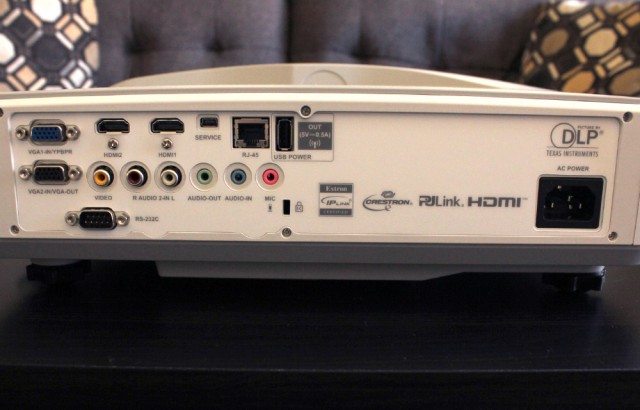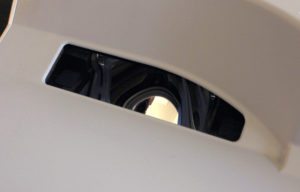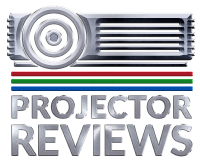ZW300UST Hardware Overview
The Optoma ZW300UST is 15 inches wide, 5 inches tall and 12.5 inches in length. The way Optoma designed the body makes it look smaller than it is, but it's still no portable. The design is typical of an ultra-short throw projector. It has a healthy number of inputs and connectors, discussed in the section below.
I was thrilled to find the focus level in an easy-to-locate spot on the outside of the projector. The Epson PowerLite 680 I just reviewed had a well-hidden focus level that I had to find by looking in the manual. The ZW300UST Optoma sent to me is their review unit, and didn't come with a user manual, so I was grateful I didn't need it to find how to focus the thing. I'll talk about that focus lever in the Lens section of this page.
The inputs and connectors are on the front of the projector - that is, facing the screen), opposite the recessed lens located toward the back. There's no cable cover (normally you'll only see a cable cover on a UST projector if the inputs are on the side), so it's easy to access those ports without having to remove a cover or work around one.
On the other hand, it's easier to access the connectors and cables if they are on the side, once the projector is mounted, because there are only inches between the projector and the wall mount. The control panel and indicator lights are located on top of the projector, in front of the lens and above the inputs and connectors toward the front. You've got your regular LED lights: Standby, Temp and Lamp.
The hot exhaust vent is located on the right side of the projector, on the opposite side of the lens. The air filters and air intake vents are on the left, closest to the lens. There are two RF emitters for the remote control - one on the back, and one on the front control panel. Let's move on to a more in-depth look at those inputs and connectors.
[sam_pro id=1_101 codes="true"]
Inputs and Connectors Panel
The Optoma ZW300UST has all the necessary inputs and connectors for business and education applications. Starting from the left, we have a VGA In port for connecting a computer to the projector, and directly below that, a VGA Out to connect a monitor. At the top, next to the VGA In, there are two HDMI ports - one of which supports MHL. A Service port lives next to those. On the top far right, there is a RJ-45 wired LAN input, and a USB power-out port for charging streaming dongles such as the Chromecast. This is a setup we will be seeing more of in the future, as streaming becomes more and more, well, mainstream.

The Optoma ZW300UST has a healthy amount of inputs and connectors - moreover, it has all the necessary ports for business and education applications.
On the lower portion of the panel, we have a Video input next to the VGA Out, and two instances of Audio In and Audio Out ports, which is awesome because it allows for speakers with different connectors to be used. That means, no matter what speakers you have, they're likely to work with this projector. Next to the last Audio In port is an input for a microphone, and under that is the Kensington Lock for security.
Our final port is the obligatory RS-232C for old-school command and control. The AC Power port is on the far right, away from all of the action. Overall, this projector has a very well laid out inputs and connector panel that is sure to cater to your presenting needs.



